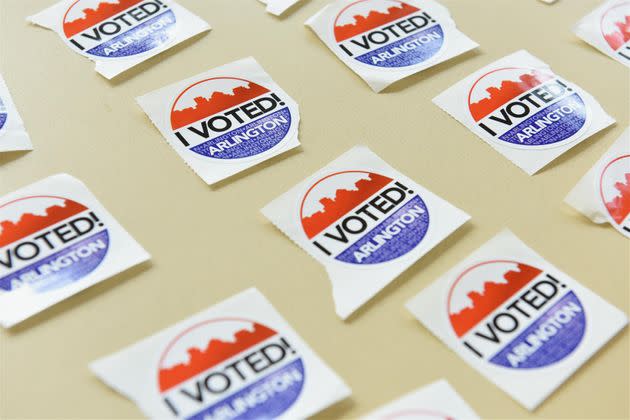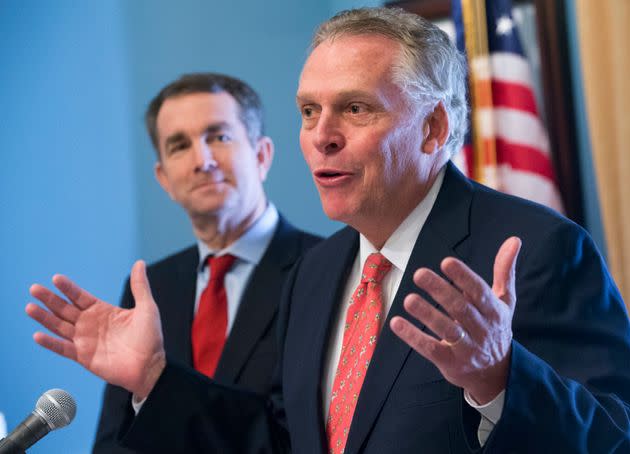‘The Dark Ages Are Upon Us’: Virginia Dems Fear Voting Rights Rollback After GOP Sweep
- Oops!Something went wrong.Please try again later.

As Republicans raced forward with dozens of new laws to restrict voting rights in 19 states this year, Virginia Democrats sped just as quickly in the opposite direction.
Democrats, who won control of the Virginia state legislature in 2019, passed new laws to expand early and absentee voting and allow Sunday voting for the first time. They repealed the state’s restrictive photo-ID requirement and approved one of the nation’s most expansive laws to protect the right to vote, a state-level version of the Voting Rights Act of 1965 that specifically outlawed discrimination based on race, ethnicity or disability status and restored key provisions of the federal law that long oversaw Virginia elections before Supreme Court rulings gutted it.
Together with aggressive efforts from three successive governors to restore voting rights to people with felony convictions, the new laws produced a striking transition in the heart of the Old South: Last year, Virginia moved from 49th to 12th in one ranking of how easy it is to vote in each state.
But a GOP sweep of last Tuesday’s elections, in which Republicans won races for governor, lieutenant governor and attorney general while also retaking majority control of the Virginia House of Delegates, threatens to reverse that progress just as quickly as it was made. And it could immediately kill ongoing efforts to restore voting rights to another quarter-million Virginians who can’t vote because of felony records.
“The dark ages have come upon us, unfortunately,” Del. Jay Jones (D) told HuffPost. “We’re heading towards a bad place for voting rights and voter protection. … I think they’ll use all of the [tools] that they’ve got in front of them to try to roll it back to a place where we were just a few years ago.”
Gov.-elect Glenn Youngkin (R), who defeated former Gov. Terry McAuliffe (D) in the gubernatorial race, has not indicated how much of a priority curbing Democrats’ voting rights advances will be. But during the campaign, he called “election integrity” ― the euphemism Republicans have adopted to nod to voter fraud conspiracy theories and roll back voting rights nationwide ― the most important issue in the race, and promised to create an “election integrity task force” that would seek to reestablish voter-ID laws and make other changes to election laws.
The state’s most conservative lawmakers have already indicated that they will seek to use their newfound power to push conspiratorial audits of last year’s election, like the one that has already taken place in Arizona, and attempt to advance voter-ID measures and other proposals that would undercut the new laws. The American Conservative Union, an influential right-wing organization, said that repealing the voting rights laws should be one of the new Republican majority’s top priorities.
A drastic law of the sort Republicans approved in Georgia may be difficult to enact in Virginia, where Democrats hold a 21-19 advantage in the state Senate. But even if the GOP fails to go that far, it could blunt one of the hallmarks of Virginia’s recent voting expansion by doing nothing at all.

Over the last decade, Virginia governors from both parties have used executive orders to restore voting rights to more than 200,000 Virginians with felony convictions, a stunning reversal in a state that is one of just three ― along with Kentucky and Iowa, where governors have also signed restoration orders ― that still permanently strip people with felony convictions of their voting rights.
In February, Democrats approved a measure to amend the state constitution to make restoration automatic as soon as a person is no longer incarcerated. Gov. Ralph Northam (D) followed by expanding Virginia’s restoration executive order to include people on parole and probation, restoring voting rights to 69,000 Virginians.
Fully approving the amendment remains important, advocates argue, because it would end the requirement that governors restore rights on a case-by-case basis, remove the burden of restoration from individual Virginians, and ensure that future governors cannot unilaterally reverse the state’s restoration push. It could result in the restoration of voting rights to another 250,000 people,according to the ACLU of Virginia.
One of every five Black Virginians is still disenfranchised due to a felony conviction, the group has said.
Altering the Virginia Constitution, however, requires lawmakers to pass identical bills in two consecutive legislative sessions, and voters to approve of the change via ballot referendum.
Had Democrats held the House of Delegates, passing the measure again would have been a priority. Now, Republicans hold the power to kill the proposed amendment merely by never taking it up for a vote.
They all voted against Sunday voting. They all voted against the Virginia Voting Rights Act, which expanded access to the ballot box. I have no expectation, now that they’ve got the majority, that they will compromise on this at all.Del. Jay Jones (D)
Republicans have supported restoration in Virginia before: Gov. Bob McDonnell, the state’s last GOP leader, kicked off the current push by streamlining the restoration process in 2010. Three years later, he updated it again, allowing him to restore voting rights to more people with felony convictions than any governor in Virginia history, a record both McAuliffe and Northam have since surpassed.
But Republicans voted down a McDonnell-backed constitutional amendment to codify his restoration order, and under McAuliffe, GOP legislative leaders successfully sued to invalidate an executive order that would have allowed Virginia governors to restore voting rights en masse.
Just two Republicans voted in favor of the proposed amendment in February. That has generated pessimism among Democrats about the restoration bill’s odds under the new GOP majority.
“My inclination is that it will halt in its tracks,” Jones said. “I can’t imagine that it’s going to go anywhere.”
House Republican Leader Todd Gilbert, who opposed the restoration amendment this year, did not respond to requests for comment about the GOP’s current plans. Garren Shipley, a spokesman for Gilbert’s office, told InsideNOVA this week that the new GOP caucus had yet to meet or discuss the amendment.
But Virginia Republicans, Jones noted, universally opposed nearly every other voting bill Democrats pushed this year.
“They all voted against Sunday voting. They all voted against the Virginia Voting Rights Act, which expanded access to the ballot box,” he said. “I have no expectation, now that they’ve got the majority, that they will compromise on this at all.”
Youngkin, who has not explicitly stated his position on the amendment or restoration by other means, would still have latitude to continue restoring rights via executive order even if the amendment dies. A spokesperson for Youngkin’s campaign did not respond to requests for comment about his position on restoration.
During the campaign, he aired an ad that highlighted McAuliffe’s record restoring rights to people with felony convictions in which a Virginia sheriff noted that it made “it easier for felons to get a gun.” The ad argued that McAuliffe’s broader criminal justice reform agenda, which included the restoration of voting rights, would make Virginia “less safe.”
The end of Virginia’s aggressive period of restoration, if Youngkin were to reverse course, would have dire effects for the overall state of voting rights in the state. It would also be a major setback for the restoration movement nationwide. More than 1 million people with felony convictions have regained voting rights over the last decade, and Virginia, Kentucky and Iowa are responsible for nearly half of them, according to the Sentencing Project, which advocates for voting rights restoration and broader criminal justice reforms.
But more than 5 million people are still disenfranchised because of felonies, the Sentencing Project said in a 2020 report. If its estimates are correct, proposed constitutional amendments in Kentucky and Virginia alone could reenfranchise roughly 10% of them.

A reversion from the last decade of restoration would have particularly negative effects on the commonwealth’s Black residents, who make up a majority of those who have lost rights to a felony conviction, according to the ACLU of Virginia. Even more so than the litany of other changes Democrats made to voting laws, restoration was key to stripping away the remnants of Jim Crow in the commonwealth: The permanent ban on voting for people with felony records dates to Virginia’s 1902 constitution, which explicitly sought to disenfranchise Black Virginians.
Supporters of the restoration amendment have vowed to fight to keep it on the agenda, and have drawn at least some hope from Republican embraces of restoration in other parts of the nation, including Kentucky, Iowa and Mississippi.
“Voting is a fundamental right and both parties should support it,” said Mary Bauer, the executive director of the ACLU of Virginia. “It shouldn’t be subject to the whim of a particular party or lawmaker. It should be enshrined in our law.”
Restoration, she said, “is essential and it has to happen, and we’re going to continue to fight for it.”
Youngkin’s campaign also did not respond to requests for comment about whether he would support the repeal of laws like the Voting Rights Act of Virginia. In theory, Virginia’s election should offer ample evidence to Republicans that they don’t need to roll back Democrats’ voting rights expansions and implement new restrictions to win in a state like Virginia, which had trended blue for a decade until massive turnout, fueled in part by Youngkin encouraging supporters to vote early, helped generate Republican victories. And once again, there was no evidence of fraud, despite right-wing claims to the contrary throughout the final weeks of the campaign.
“I’m hoping that the governor-elect will reflect on this election and realize that this is a fair system that we have in Virginia, and that it’s good for all Virginians,” said current House Majority Leader Charniele Herring (D), who even before the election celebrated that Youngkin had placed so much emphasis on early voting.
But Herring is “not that confident” that will be the Republican takeaway from last week’s results, and early suggestions are that it won’t be. It’s too early to assess how Republicans will target the suite of voting changes made last year, but Herring expects that Democrats will have to “continue to fight for every Virginian, no matter [their] political affiliation, to have access to the ballot.”
If Republicans choose that path, it will place immense pressure on Democrats’ bare-bones majority in the state Senate, where a single lost vote could cause a tie that Lt. Gov.-elect Winsome Sears (R) would have the authority to break.
For now, voting rights advocates are trying to remain hopeful that Youngkin’s campaign rhetoric about “election integrity” was just that, and that he’ll govern as the moderate he pitched himself as in television ads and his victory speech, rather than as the sort of hard-line conservative candidate who refused to refute voters’ conspiracy theories and embraced surrogates who spread baseless claims that Democrats stole the 2020 election and were attempting to steal Virginia’s.
“My optimism comes in the hope that Republicans don’t come in and mirror what’s going on across the nation, but actually try to [pass] some policies that are better for the people of the commonwealth of Virginia,” said Joe Dillard, a former leader of the Norfolk-area NAACP chapter. “It’s definitely forced optimism.”
This article originally appeared on HuffPost and has been updated.



